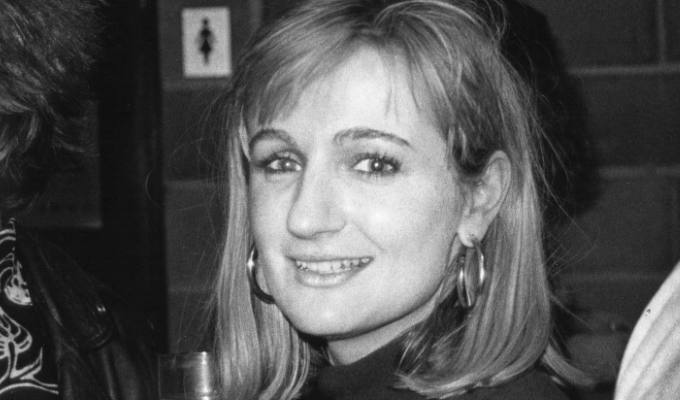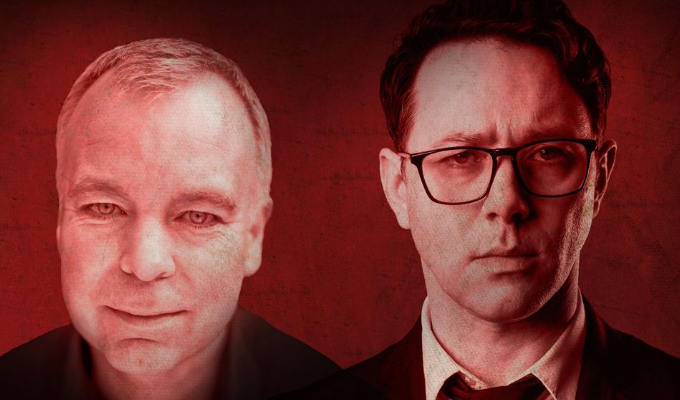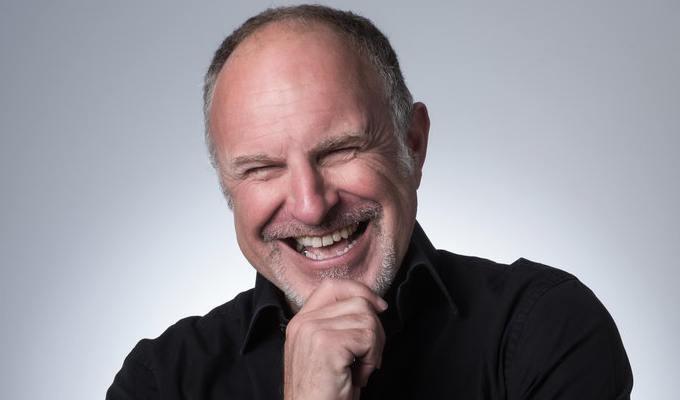 © BBC/Passion Docs/Richard Davis
© BBC/Passion Docs/Richard Davis Caroline Aherne: Queen of Comedy
Review of the Arena documentary
That we know how Caroline Aherne’s story ends so tragically early lends a poignancy to this touching documentary about her career and her troubles. But Queen Of Comedy is more a celebration of her achievements than dwelling on the ‘tortured clown’ elements of her life.
Some of it is told in her own words. Speaking of her comedy ethos she says: ‘I knew if you strip it bare and have funny characters but with love in and everything it would work. Because I think too much happens in sitcoms… people are funny aren't they?’
That was the ethos of The Royle Family, a sitcom that made Seinfeld’s ‘show about nothing’ look like The Fast And The Furious by comparison. But although modest in scale, it was high in ambition, rewriting the rules of the genre.
She started off in a similar vein on Manchester’s comedy scene with an act which eschewed gags, chatting away haphazardly, apparently, and with a disarming nervousness, which got the audience on side.
All changed when she joined the Stockport radio station KFM where she met Craig Cash, who would become her long-time collaborator. He recalls her arriving with a big bag packed full of fake dog poo , big teeth and comedy glasses – anything to get a laugh.
‘She was just a complete and utter crackpot,’ he says. ‘Within half an hour I felt like I’d known her all my life.’
Likewise Aherne wrote in her diary that night: ‘I’ve just met the funniest man in the world.’
The live scene in Manchester of the early 1990s was thriving with a new brand of intelligent working-class comedy. Among all the fascinating archive material here is a pilot of a Granada sketch show called The Dead Good Show, in which she starred alongside John Thomson and Steve Coogan. The skit included here has her as a weather presenter, foreshadowing the Scorchio! girl that would propel her into the national conscience on the Fast Show.
Also on the scene was Henry Normal, who joined with Aherne and Cash in creating the Mrs Merton Show, with Dave Gorman also writing. We see here a glimpse of the pilot, with Carol Thatcher as the guest, as well as the inevitable clip of her fax-innocent pensioner alter-ego asking the question of Debbie McGee that has entered the culture: ‘What first attracted you to the millionaire Paul Daniels?’

More telling, though, was her run-in with Bernard Manning, which stretched the sweetness of her character to the limit. But it was a ballsy move inviting him on to the show and confronting him head-on about the racism is comedy. The encounter was not an easy watch, but made for great TV.
There’s also more intimate footage, such as all four of the Mrs Merton writers visiting the Granada Studios tourist attraction and acting out a Coronation Street scene. ‘She used to just have a crack and just have fun,’ says Cash. ‘They were very happy days, them.’
It seems infectious. Normal recalls her persuading BBC bigwigs to do a funny walk, purely for her entertainment.
She comes across as possessing a beautiful, impish and generous soul, if also fragile. Smart, too - she’s seen here telling Michael Parkinson about her 177 IQ – although her intelligence was matched with a touch of the mad scientist, ditzy in the everyday.
That’s at odds with how she was portrayed in the tabloids, with a troubled love life and often falling drunkenly out of London’s Groucho Club where she’d been hobnobbing with the hardest partying animals on the Nineties celebrity scene. Though with distance it’s easy to see drink as a mask for her shyness and insecurities – it’s clear she had a vulnerable and delicate psyche. ‘She carried a lot of sadness,’ one of the contributors says.

There is plenty of fodder for the armchair psychologist here. Aherne and her brother, Patrick, were born with a rare form of retinal cancer, affecting her eyesight (and she spent much of her youth in hospital) and she daredn’t have children - much as she would have loved to - for fear of passing it on. But there’s sensibly no attempt to over-analyse Aherne’s drive and creativity beyond what is apparent in her work.
In the Royle Family she and Cash simply reflected the Northern working-class upbringing they knew so well: a world were affection is shown through insults while slobbing on the sofa in front of the TV. Plot, my arse, this was real life and it resonated strongly with the audience, growing from modest beginnings to bona fide cultural phenomenon.
It was inspired by the 1994 fly-on-the-wall documentary Three Salon At The Seaside (still available on iPlayer) which revealed the everyday humour of women having their hair done in Blackpool. ‘All the comedy you’ll ever want in the world you’ll find at the supermarket, if you wander around an listen,’ she told Cash.

The Royle Family was her crowning achievement and probably reached its pinnacle with the 2006 Queen of Sheba special, marking her reunion with Cash after a falling-out that saw her temporarily flee to Australia. The documentary’s only omission is on the latter professional years, where nothing captured the magic of the Royles.
But who knows what else she could have achieved had she not died of lung cancer in at the age of 52 in 2016? And the Arena film shows how her warm humour shone through even as she battled the disease.
In such a short life she left a remarkable body of work, and this suitably warm-hearted documentary stands as fitting testimony to that amazing legacy.
Review date: 25 Dec 2023
Reviewed by: Steve Bennett








